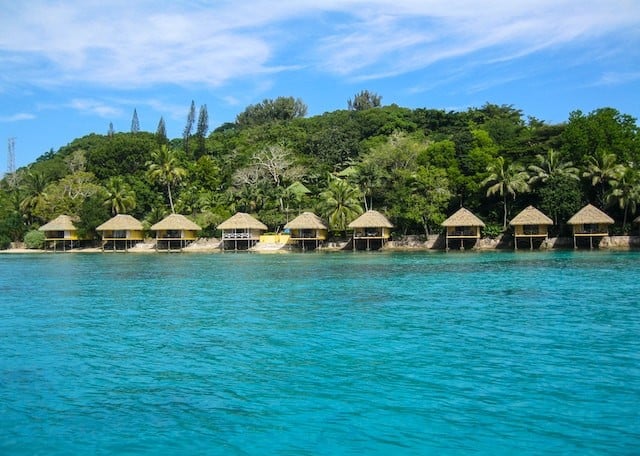As a relatively isolated region, the South Pacific may not see the tourist volume of the Caribbean, but it is steadily increasing in popularity for its unspoiled beauty and distinctive Oceanic culture, with Vanuatu emerging as a favored destination among foreign tourists.
This small archipelago remains shrouded in mystery, with limited information available to travelers compared to other popular tourist destinations. Consequently, ‘Is Vanuatu safe?’ is the question asked more frequently asked by travelers and prospective residents.
Vanuatu Safety Overview

Though same-sex marriage is unrecognized in Vanuatu, the Penal Code Act of 2006 legalized same-sex relationships; however, social acceptance is limited compared to Western countries, and public displays of affection may provoke negative reactions.
Overall, Vanuatu citizens are friendly. Despite the odd occurrence of petty crime, the locals greet tourists and foreigners living in Vanuatu with a smile and respect and offer helpful advice and insider tips when asked.
As a tropical island nation in the South Pacific, heavy rain and tropical cyclones are expected during the December to April rainy season. Additionally, Vanuatu’s active seismic zone places the country at risk of high-magnitude earthquakes. Disaster risk reduction measures including enhanced building regulations and a tsunami warning siren have been implemented by the Vanuatu government. Travelers to Vanuatu should monitor local weather updates and have travel insurance for emergencies.
Crime and Safety Comparison of Oceanic Countries
Numbeo’s Crime and Safety Index rates crime and safety. A high crime index means high and serious crime, and a high safety index means a safer environment.
Country | Crime Index | Safety Index |
Vanuatu | 41.65 | 58.35 |
Fiji | 56.56 | 43.44 |
Australia | 47.16 | 52.84 |
New Zealand | 48.15 | 51.85 |
Papua New Guinea | 79.87 | 20.13 |
Samoa | 42.06 | 57.94 |
Tonga | 60.98 | 39.02 |
Data Source: Numbeo | ||
Are Americans safe in Vanuatu?
Current travel advisories from travel.state.gov classify Vanuatu as a safe destination for Americans. Travel advisories are categorized into four levels:
- Exercise normal precautions
- Exercise increased caution
- Reconsider travel
- Do not travel
The current travel advisory level of “exercising normal precautions” means it is safe to visit Vanuatu based on investigations of crime rates, health risks, emergency care facilities, and overall safety conditions. American citizens are advised to exercise caution when visiting the island, such as being aware of their surroundings, using licensed taxis, and avoiding risky neighborhoods associated with crime and drug activity. Visitors should also avoid public displays of affection, particularly same-sex couples to avoid offending local sensitivities.
Traveling Around Vanuatu
Americans do not require a tourist visa to visit Vanuatu but may be asked for proof of sufficient funds for the duration of their stay. As an archipelago comprising 83 small islands, Vanuatu has limited public transportation. However, amenities and points of interest are relatively easy to get to in some of the country’s more popular locations. The capital city of Port Vila offers some of the best things to do in Vanuatu, and many foreigners prefer a rental car to explore its attractions at their own pace.
US driver’s license holders need an International Driving Permit (IDP) to drive legally in Vanuatu. Australians do not require an IDP to drive in Vanuatu for up to three months. Foreign drivers should familiarize themselves with local traffic laws to ensure a safe driving experience on Vanuatuan roads.
There are several risks of driving on tropical Oceanic islands with mountainous terrain, such as wildlife encounters with wildlife, narrow or poorly maintained roads—especially in rural areas—and limited lighting while driving after dark. Car theft is rare in Vanuatu, but break-ins do happen, particularly in cars with visible belongings. Drivers should park in secure areas and keep car doors locked at all times.
Extreme weather conditions are also a risk when driving in Vanuatu. The cyclone season raises alert levels, bringing hazardous driving conditions due to intense storms, washed-out roads, and poor visibility.
Small local aircraft travel is the primary mode of transport to visit smaller islands; however, many domestic airports are equipped with basic or no facilities. Airports operating international or domestic flights may cancel them at short notice due to adverse weather conditions.
Health Risks in Vanuatu
Vaccine considerations

- Polio
- Rabies
- Hepatitis A
- Hepatitis B
- Measles
- Rubella (MMR)
- Tdap (tetanus, diphtheria and pertussis)
Vanuatu has been categorized as having a risk of insect-borne diseases, including malaria, Zika (ZIKV), and dengue. Travelers should apply insect repellent when traveling around the islands to prevent malaria and other diseases caused by mosquito bites.
Although the yellow fever vaccine is not mandatory when visiting Vanuatu, tourists arriving from a country with a yellow fever risk within the past six weeks must present a yellow fever vaccination certificate issued at least ten days before arrival.
Other health concerns
While essential medical services in Port Vila medical healthcare facilities are available, Vanuatu’s small and limited healthcare system means travelers should secure adequate travel insurance that includes medical evacuation cover for emergency medical treatment. Additionally, not all prescription drugs are available in Vanuatu pharmacies, so it’s vital to carry sufficient medications before departure. Expats should also consider health care expenses and insurance in their Vanuatu cost of living.
Vanuatu Safety at Night
Vanuatu is generally safe to walk at night, but like other countries, travelers must always be vigilant and steer clear isolated locations or streets with limited street lighting. Travelers should follow the advice of resort staff to avoid walking down streets with poor lighting to minimize the risk of potentially dangerous situations such as violent crime or sexual assault.
Port Vila and other popular islands to visit and retire from in Vanuatu include Espiritu Santo, Luganville, and Tanna Island. These destinations are well protected and home to many expats, visiting tourists, and helpful locals, offering a safe experience during night-time activities.
Is Vanuatu safe to live in?
As one of the South Pacific’s safest countries, Vanuatu is safe to live in and visit. Many American and Australian citizens choose to move to Vanuatu permanently through the Vanuatu citizenship by investment program, which allows foreign nationals who contribute to the economy to obtain Vanuatu citizenship.
Frequently Asked Questions about Vanuatu Safety and Security
How safe is Vanuatu for tourists?
Vanuatu is one of the safest countries by international standards. Besides petty theft and minor drug use, serious crimes such as sexual harassment or armed robbery are rare.
With eight volcanoes–five of them being active volcanoes–the country is at risk of volcanic activity, including eruptions, ash clouds, and lava flows in volcanic areas, which can impact travel safety and security.
Is Vanuatu a peaceful country?
Vanuatu is peaceful, with civil disorder and political unrest being uncommon. However, it’s essential to stay up to date with detailed information issued by local media and authorities regarding travel advisories.
Why is it risky to live in Vanuatu?
The risks of living in Vanuatu include the threat of natural disasters from volcanic activity, earthquakes, and cyclones. If a natural disaster occurs, residents should follow the guidance of local authorities and have an emergency plan in place.
Outer islands of Vanuatu also pose an associated risk to residents due to having basic or no facilities for healthcare services and limited domestic flights for emergency assistance.
What to avoid in Vanuatu?
Vanuatu is known for safety, but things you should avoid when visiting the country include:
- Consuming alcohol on the streets
- Taking unlicensed taxis
- Carrying large sums of cash
- Illegal drugs
- Using an unlicensed dive operator
Travelers and residents should also avoid trespassing by asking permission from local landowners to access private beaches and other areas for outdoor activities.
When to avoid Vanuatu?
As a tropical country, Vanuatu is suitable for visiting year-round. However, the cyclone season from December to April brings high rainfall and stormy weather, which can occur at short notice.
Can you drink alcohol in Vanuatu?
Vanuatu’s legal drinking age is 18; however, it’s rarely enforced. Many vendors sell alcohol without requesting proof of age.
Can you drink tap water in Vanuatu?
Locals in major cities like Port Vila and Luganville drink tap water, which is generally considered safe for drinking. Visitors are advised to stick to bottled, filtered, or boiled water to avoid potential stock upsets from unfamiliar sources.
Are there risks of using ATMs in Vanuatu?
Travelers are advised to withdraw cash from ATMs located in Vanuatu banks or other secure, well-monitored areas due to the risk of ATM fraud. While you should carry large amounts of cash, US and Australian dollars are widely accepted in tourist areas, and a small amount can be handy if local currency isn’t available.

 Gizane Campos
Gizane Campos 
